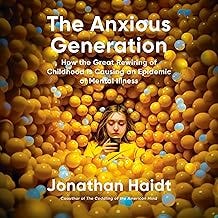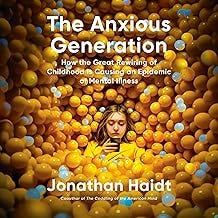The Anxious Generation: How the Great Rewiring of Childhood Is Causing an Epidemic of Mental Illness by Jonathan Haidt.
The Anxious Generation is one of those books I wish I had read fifteen years ago. It would have changed so much about the way I parented my kids, now ranging in age from 25 to 16. But none of us could have predicted in 2010 the profound impact technology would have on our children. And (let's be honest here) I am such a tech enthusiast that I'm not sure I would have listened. Technology is good, right! Progress!
As author Jonathan Haidt explains, The Anxious Generation tells the story of what happened to the generation born after 1995, commonly known as Gen Z. This cohort experienced the rapid adoption of smartphones and social media just as they were entering adolescence. Haidt argues persuasively that those two innovations are primarily responsible for the dramatic increase in anxiety and depression rates among Gen Z. He calls this phenomenon "the great rewiring of childhood."
Haidt writes, "Over the course of many decades, we found ways to protect children while mostly allowing adults to do what they want. Then quite suddenly, we created a virtual world where adults could indulge and momentary whim, but children were left defenseless."
The book delves deeply into studies conducted over the past two decades on teenage anxiety and depression, exploring how these patterns differ subtly between girls and boys. Girls tend to be drawn to social media, where they face body shaming and bullying, while boys gravitate toward online gaming and pornography.
Haidt proposes four key reforms to address this crisis:
No smartphones before high school. This would delay the ubiquitous access to social media that is most harmful during the vulnerable tween years.
No social media before 16. Haidt believes this should be law, with age verification systems in place. (Currently, the minimum age to sign up for Instagram is 13, but there are no effective checks.)
Phone-free schools. My wife substitutes in our local school district, and I regularly hear horror stories from her. Simply having a phone in their pocket is insufficient; a phone locker where the phones remain during school hours is a minimum requirement. I will be recommending this book to our local school board, with hopes that they will consider this policy in particular.
More unsupervised play and childhood independence. Haidt argues that while kids are underprotected in the virtual world, they are often overprotected in the real world. Kids need risk and free play to develop the coping skills necessary to manage anxiety as they grow older.
This is not a light read, but it is an important one—especially for parents, educators, or anyone who cares about the future of society.





Thanks for this, John.
100% agree! (Interestingly, after Betty and I visited you guys, we started listening to the audio book version that day during our drive to Seattle.)